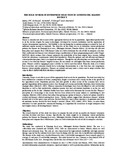| dc.contributor.author | Maina, FW | |
| dc.contributor.author | Kimani, SK | |
| dc.contributor.author | Nyikal, RA | |
| dc.contributor.author | Karugia, JT | |
| dc.contributor.author | Macharia, S | |
| dc.date.accessioned | 2015-07-22T16:12:52Z | |
| dc.date.available | 2015-07-22T16:12:52Z | |
| dc.date.issued | 2006 | |
| dc.identifier.citation | Strengthening Kenya's food security and income: Proceedings of the 10th KARI Biennial Scientific Conference Volume I, Kenya Agricultural Research Institute, Nairobi (Kenya).- Nairobi (Kenya): KARI, 12 - 17 Nov 2006. Biennial Scientific Conference, Nairobi (Kenya), 12 - 17 Nov 2006.- 9966-879-76-5.- p | en_US |
| dc.identifier.uri | http://hdl.handle.net/11295/88618 | |
| dc.description.abstract | Kenya is currently not able to meet all the appropriate food needs for its population. Agricultural productivity
is on the decline despite the many technologies developed by research institutions and the application of
various dissemination approaches. Soil fertility is also declining due to nutrient mining occasioned by lack of
sufficient surplus income to replenish. The objective of this study was to (i) determine current production
patterns for farmers in Kianjogu focal area, Githunguri division, Kiambu district; (ii) develop risk efficient
farm plans and compare these with farmers’ plans in a bid to determine the role of risk in enterprise selection.
Risk coefficients for farmers were obtained using a modification of linear programming model called Target-MOTAD,
which assumes that a farmer minimises the probability of his farm output, hence income, falling
below his subsistence requirements (safety-first hypothesis). From the optimal, and risk efficient and farmers
current production plans, dairy is an important enterprise. Though the risk efficient plans are not feasible, as the
income is less than the farmers’ targeted income, the net returns are still higher than from current production
plans. Farmers could be engaging in more activities in a bid to meet this deficit. From the study, it is evident
that researchers and extension should focus technology dissemination in a way that does not compromise
farmers current priority enterprises. Farmers are rational and may make a choice not to adopt activities that
come in direct conflict with their subsistence requirements. | en_US |
| dc.language.iso | en | en_US |
| dc.title | The role of risk in enterprise selection in Githunguri, Kiambu district | en_US |
| dc.type | Presentation | en_US |
| dc.type.material | en_US | en_US |

